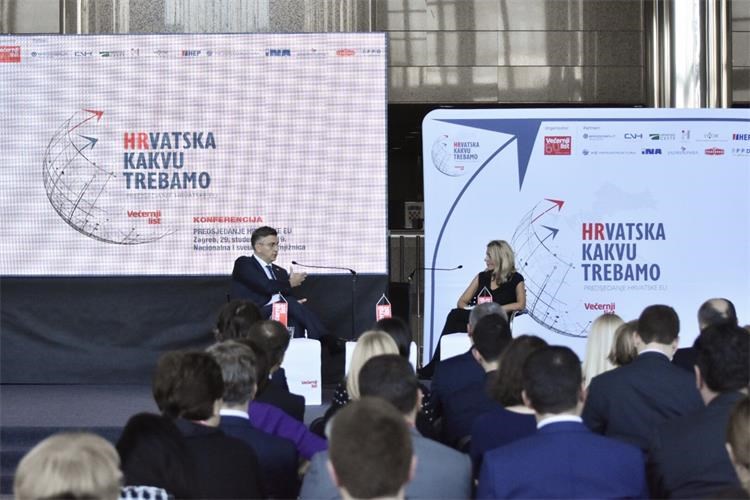- Published: 29.11.2019.
Plenkovic: Presidency opportunity for strengthening Croatia's role in Europe
Being the chair of the European Union in the first half of 2020 will be a political opportunity for positioning and strengthening Croatia's role in Europe and for making the Croatian public more sensible to the fact that Croatia is a part of that Europe, Prime Minister Andrej Plenkovic said at a conference on Friday.
"We are part of that and we are also among the decision-makers," Plenkovic said at the conference on Croatia's presidency over the EU and the pertaining opportunities and challenges, organised by the Zagreb-based Vecernji List.
We act as stakeholders and the purpose of all that we are doing has a coherent vision of strengthening Croatia's position in foreign affairs. All experienced counterparts tell us that our position in foreign affairs has never been as influential as it is now, the premier said.
Underscoring that the EU membership permanently brings benefits, Plenkovic claimed that the media coverage of Europe-related topics was poor in the country.
The government has conducted dialogues at more levels in order to sensitise people to the EU, but it is difficult to make headway when the topic is not multiplied through media, he added.
He also explained that a majority of EU members avoided to put high on the agenda the topics of particular concern for them during their presidency over the EU, and therefore Croatia would not insist on the topic of its Schengen membership bid in the next six months.
Three big topics high on agenda
During Croatia's presidency, the EU is supposed to address three major topics: the departure of Great Britain from the EU, the 2021 -2027 financial perspective and a summit meeting for western Balkan aspirants set for May in Zagreb.
As for the summit meeting between the EU and candidates and potential candidates for membership, Plenkovic said that there were plans to prepare a roadmap for the next 10 years for this closest neighbourhood.
"Croatia will raise the topic of Bosnia and Herzegovina, the rights of the Croats as one of the (three) constituent peoples, the prospects of those countries, about which we know more than others," Plenkovic said.
Considering Brexit, he noted that one of the ten biggest contributors to the EU budget is leaving the Union and therefore it will be important to retain the budget funds at the same level.
Of 100% of EU funds, 80% are secured by the most developed members, he added.
He also underlined that without EU funds, Croatia would not be the same.
Reasons against wire along Croatia's borderline
Asked whether incidents involving migrants would make it harder for Croatia to enter the Schengen area, the premier said that the government had been in a situation to erect wires along the border line, but it opted for strengthening the police staff for that job.
He said that Croatia's borderline with Serbia, Bosnia and Herzegovina, and Montenegro was longer than that one between Finland and Russia.
"This is a vast area which we are supposed to protect. Our policy has been: if we erect the wire along the border with Bosnia and Herzegovina, which is not only between us and the neighbouring country but also between Croatians in Croatia and Bosnia and Herzegovina, I will not feel good," Plenkovic said.
Text: Hina
